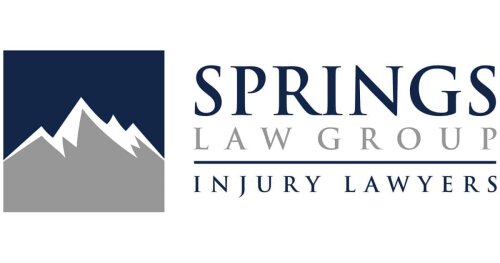Best General Litigation Lawyers in Colorado
Share your needs with us, get contacted by law firms.
Free. Takes 2 min.
Or refine your search by selecting a city:
List of the best lawyers in Colorado, United States

About General Litigation Law in Colorado, United States
General litigation encompasses a broad range of legal disputes that do not fall within the realm of specialized legal practice areas such as family, bankruptcy, or patent law. In Colorado, general litigation typically involves resolving conflicts between individuals, businesses, or governmental entities through negotiation, mediation, arbitration, or court proceedings. Cases can range from contract disputes and property issues to personal injury claims and employment disagreements. The process is governed by both state and federal rules of civil procedure, court-specific local rules, and Colorado statutes. Whether pursued in county courts, district courts, or federal courts located in Colorado, general litigation aims to resolve disputes fairly and in accordance with Colorado law.
Why You May Need a Lawyer
There are many situations in which working with a lawyer experienced in general litigation can be essential. Some common circumstances include:
- You are being sued or are considering suing someone for breach of contract or other civil matters.
- You are involved in a property dispute, such as boundaries, titles, or adverse possession.
- You face disputes with a business partner or shareholder.
- You need to resolve issues related to landlord-tenant agreements.
- You are dealing with a personal injury claim resulting from an accident, negligence, or intentional act.
- You are accused of fraud, defamation, or other civil wrongs.
- You have a dispute over the terms of a will or trust (probate litigation).
- You want to appeal a decision from a lower court.
Lawyers help assess the merits of your case, navigate procedural rules, ensure timely filings, negotiate settlements, and represent you in court. They protect your rights and help seek the best possible outcome.
Local Laws Overview
General litigation in Colorado is primarily governed by the following local legal frameworks:
- Colorado Rules of Civil Procedure (C.R.C.P.): These rules set forth the procedures for civil lawsuits heard in Colorado state courts, including how to start a lawsuit, file motions, conduct discovery, and present evidence at trial.
- County and District Courts: Colorado is divided into multiple judicial districts, each with designated courts that handle civil matters. The nature and amount involved in the dispute often determine which court will hear the case.
- Statutes of Limitations: Colorado law imposes strict deadlines for filing different types of lawsuits, known as statutes of limitations. For instance, most contract claims must be filed within three years, while personal injury claims generally have a two-year filing window.
- Alternative Dispute Resolution: Courts may require or encourage parties to attempt mediation or arbitration before proceeding to trial, particularly in civil disputes.
- Local Court Rules: Each court may have its own specific procedures and local requirements, including filing protocols and pretrial conference rules.
Understanding these rules and requirements is vital to ensuring your case proceeds smoothly and that your interests are protected throughout litigation.
Frequently Asked Questions
What is general litigation?
General litigation refers to legal disputes resolved through the civil court system, including issues like contract disagreements, property disputes, personal injury claims, and more.
How do I know if I have a valid case?
If your legal rights have been violated or you have suffered losses due to another party’s actions or inactions, you may have grounds for a lawsuit. Consulting with a Colorado litigation attorney is the best way to evaluate your situation.
How long do I have to file a lawsuit in Colorado?
Statutes of limitations vary depending on the type of case. For example, personal injury claims typically have a two-year limit, while contract disputes commonly have three years. Missing the deadline may prevent you from filing.
Can I represent myself in a general litigation matter?
Yes, you have the right to represent yourself, known as proceeding "pro se." However, litigation involves complex procedures and legal principles where experience and legal knowledge can be critical to your success.
What are the steps involved in a general litigation case?
Litigation typically includes investigation, filing a complaint, serving documents to the opposing party, discovery (exchange of information), pretrial motions, negotiation or mediation, trial, and possibly an appeal.
What happens if I lose my case?
If you are unsuccessful, you may be responsible for damages or court costs. You may have options to appeal the decision to a higher court, but there are strict deadlines and procedural rules for appeals.
What is discovery?
Discovery is the process during which both parties exchange information, documents, and evidence relevant to the case. It may include interrogatories, depositions, and requests for documents.
How long does a general litigation case take in Colorado?
The duration varies greatly depending on the complexity of the case, the court’s schedule, and whether the case settles out of court. Cases can last anywhere from a few months to several years.
Do I have to go to court, or can my case be resolved another way?
Many cases settle through negotiation, mediation, or arbitration without ever going to trial. Your lawyer can advise you on the best approach for your situation.
How much does it cost to hire a general litigation lawyer?
Fees vary widely based on the attorney’s experience, the complexity of the case, and whether it goes to trial. Common fee structures include hourly rates, flat fees, or contingency fees (in some personal injury matters).
Additional Resources
If you are seeking more information or support regarding general litigation in Colorado, consider exploring these resources:
- The Colorado Judicial Branch - Offers self-help resources, court forms, and information about the state's courts.
- Colorado Bar Association - Provides a lawyer referral service and legal education materials for the public.
- Office of the Colorado Attorney General - Handles consumer complaints and enforces state law.
- Colorado Legal Services - Offers free or low-cost legal aid to eligible individuals facing civil legal issues.
- Local county court websites - Each may provide rules, contact information, and resources specific to your region.
Next Steps
If you believe you have a legal dispute that may require litigation, or if you are facing a lawsuit, take these steps:
- Gather all relevant documents and evidence, such as contracts, correspondence, and any records related to your dispute.
- Write down a clear summary of the situation, including key dates and events.
- Consult with a general litigation attorney in Colorado to assess your case and discuss your rights and options.
- Review important deadlines, such as statutes of limitations, to ensure you do not lose your right to pursue legal remedies.
- Consider alternative dispute resolution methods, such as mediation or arbitration, as an alternative to trial.
A qualified attorney can help you understand the strengths and weaknesses of your case, guide you through the legal process, and advocate on your behalf in and out of court.
Lawzana helps you find the best lawyers and law firms in Colorado through a curated and pre-screened list of qualified legal professionals. Our platform offers rankings and detailed profiles of attorneys and law firms, allowing you to compare based on practice areas, including General Litigation, experience, and client feedback.
Each profile includes a description of the firm's areas of practice, client reviews, team members and partners, year of establishment, spoken languages, office locations, contact information, social media presence, and any published articles or resources. Most firms on our platform speak English and are experienced in both local and international legal matters.
Get a quote from top-rated law firms in Colorado, United States — quickly, securely, and without unnecessary hassle.
Disclaimer:
The information provided on this page is for general informational purposes only and does not constitute legal advice. While we strive to ensure the accuracy and relevance of the content, legal information may change over time, and interpretations of the law can vary. You should always consult with a qualified legal professional for advice specific to your situation.
We disclaim all liability for actions taken or not taken based on the content of this page. If you believe any information is incorrect or outdated, please contact us, and we will review and update it where appropriate.
Browse general litigation law firms by city in Colorado
Refine your search by selecting a city.










